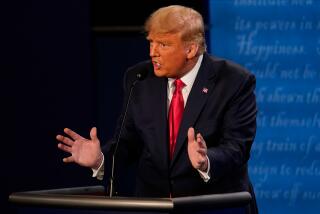Justices Urged to Reject Suit Against Nike
- Share via
WASHINGTON — Harvard law professor Laurence H. Tribe and U.S. Solicitor General Theodore B. Olson, two former rivals, teamed up Wednesday and urged the Supreme Court to throw out a San Francisco activist’s false-advertising suit against Nike, the world’s largest maker of athletic shoes.
The case has drawn wide attention because it tests the boundary between corporate free speech and false advertising.
But the suit against Nike, filed under California’s broad law against false advertising, has two wrinkles, both of which caught the attention of the justices.
First, Nike was not accused of selling goods -- such as Air Jordan shoes -- with a false sales pitch, Tribe said.
Instead, the company was accused of conducting a deceptive corporate public relations campaign that denied the company’s Asian factories were “sweat shops.” In news releases and pamphlets sent to sports teams, Nike said its workers were paid a living wage and were treated well.
Second, neither the California attorney general nor the Federal Trade Commission sued Nike for misleading statements. Typically, the consumer protection laws against false advertising are enforced by the government.
However, in this case, Marc Kasky -- a resident of San Francisco who does not buy Nike products, according to his lawyer -- sued the company and claimed the role of a “private attorney general” representing the public’s interest.
A trial judge tossed out Kasky’s suit, but last year the California Supreme Court surprised experts in free speech and business law by reviving it and clearing it to go to trial. A company can vigorously defend itself, the state high court said. But “when a business enterprise makes factual representations about its own products or its own operations, it must speak truthfully,” said California Justice Joyce Kennard for a 4-3 majority.
During Wednesday’s argument, Olson said Kasky’s suit should be thrown out because he is an “unelected, unaccountable” person who should not be authorized to pursue “an ideological agenda” in the courts.
If Kasky succeeds, “anyone with a whim, a grievance and a filing fee can become a government-licensed censor,” Olson said.
Tribe said the suit should be thrown out because companies deserve a free-speech right to defend themselves.
There is an “intense debate over globalization,” he said, and both sides deserve the right to speak. While critics are free to criticize Nike, the company should be free to defend itself.
The lawsuit is a “conversation stopper,” Tribe said. If companies can be sued for alleged misstatements in their press releases, they will be reluctant to speak at all, he said.
Tribe and Olson were on opposing sides when they last met in the Supreme Court. At issue then was the validity of the Florida election -- Olson represented then-Texas Gov. George Bush, Tribe Vice President Al Gore.
Major corporations including Microsoft and ExxonMobil, media companies (including the Los Angeles Times), the American Civil Liberties Union and the AFL-CIO joined friend-of-the-court briefs urging the court to rule that the 1st Amendment shields a company from being sued for its public statements.
But the Sierra Club, Public Citizen and other consumer activists sided with Kasky, arguing there is no “right to lie.”
Kasky’s lawyer, Paul Hoeber, said Nike made “specific factual statements” about its factories, and it did so with the intent of persuading the public to continue buying its products. “This company made representations about their products, and consumers relied on those representations,” Hoeber said.
However, the justices sounded as though they were prepared to rule for Nike.
Justice David H. Souter said Kasky sought a “show trial,” since he was not harmed by Nike’s claims.
“None of this speech was advertising in the strictest sense of the term,” added Justice Sandra Day O’Connor.
At one point, Justice Stephen G. Breyer summed up the dilemma the case presented. The government “has the right to regulate unfair, deceptive advertising” to protect consumers from being duped, he said. On the other hand, “the 1st Amendment is designed to protect all participants in a public debate.”
If the justices side with Kasky, his suit will go back to San Francisco for a trial. He has alleged that the company made false statements about its business practices, but that has not been proved.
However, if the justices side with Nike in Nike vs. Kasky, they could end the lawsuit.
More to Read
Inside the business of entertainment
The Wide Shot brings you news, analysis and insights on everything from streaming wars to production — and what it all means for the future.
You may occasionally receive promotional content from the Los Angeles Times.











